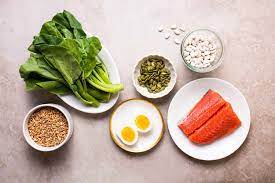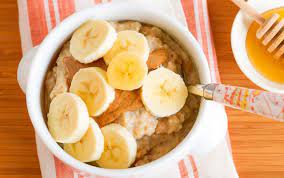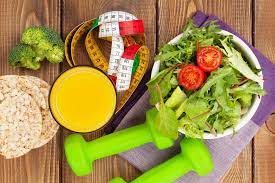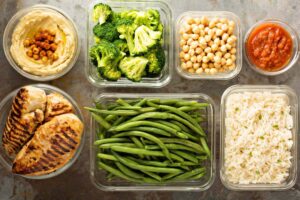The Ultimate Guide to Eating for Fitness Throughout the Day
Eating the right foods throughout the day is essential for maintaining a healthy and active lifestyle. For those looking to maximize their fitness, understanding how to choose the best meals for breakfast, lunch, and dinner can make all the difference. In this ultimate guide, we’ll discuss the foods that should be consumed in the morning, afternoon, and night to optimize your fitness goals. With the right meals, you’ll be well on your way to the healthy and active lifestyle you’re aiming for.
Why Proper Nutrition is Key to Fitness

When it comes to achieving your fitness goals, proper nutrition plays a critical role. What you eat can have a significant impact on your energy levels, mood, and physical performance. Eating the right foods in the right quantities and at the right times can help you maintain a healthy weight, build muscle, and improve your overall fitness level.
To understand why nutrition is so essential for fitness, let’s start with the basics. Your body requires nutrients to function correctly. These include macronutrients (carbohydrates, proteins, and fats) and micronutrients (vitamins and minerals). When you exercise, your body uses these nutrients to provide energy to your muscles and repair any damage caused by your workout.
Eating the right foods at the right times can help you optimize this process. For example, eating a protein-rich meal after a workout can help your muscles recover faster and build more lean mass. Eating a carbohydrate-rich meal before a workout can give you the energy you need to perform at your best.
However, proper nutrition isn’t just about timing your meals and choosing the right macronutrient ratios. It’s also about making sure you’re getting enough of the right micronutrients. These can be found in fruits, vegetables, whole grains, and lean proteins. These foods not only provide essential vitamins and minerals but also help support a healthy immune system and reduce inflammation in the body.
So, if you want to achieve your fitness goals, it’s essential to prioritize your nutrition. By fueling your body with the right foods at the right times, you can improve your energy levels, performance, and overall health. In the next sections, we’ll take a closer look at what to eat during different times of the day for optimal fitness results.
Morning Nutrition for Fitness

Breakfast is often referred to as the most important meal of the day. This is especially true for individuals looking to maintain or improve their fitness. When we sleep, our body enters into a fasted state, meaning we haven’t eaten for several hours. A nutritious breakfast helps break this fast and jumpstarts our metabolism, providing us with energy for the day ahead.
To begin your day on the right foot, aim to consume a breakfast that contains a balance of macronutrients – protein, carbohydrates, and healthy fats. Protein will help keep you feeling fuller for longer and repair and build muscle tissue, while carbohydrates and healthy fats will provide you with the energy you need to tackle your day.
A great breakfast option for fitness enthusiasts could include a serving of whole-grain toast with smashed avocado, a boiled egg, and a piece of fruit. Or, you could opt for a smoothie containing Greek yogurt, berries, and spinach for a nutrient-dense, protein-packed option.
Another thing to consider when planning your breakfast is your timing. Try to eat within an hour of waking up to maximize the benefits of breakfast. Waiting too long to eat can cause your body to hold onto fat and result in unhealthy cravings later on in the day.
Overall, fueling your body with the right foods in the morning sets you up for success throughout the day. Aim to consume a balance of macronutrients and don’t forget to prioritize hydration as well. Water is just as important as food when it comes to proper nutrition for fitness.
Afternoon Nutrition for Fitness

Afternoon is a crucial time of the day when it comes to nutrition and fitness. Many people experience a slump in energy during this time and tend to reach for sugary or high-carb snacks. However, choosing the right foods during this time can help sustain energy levels, improve focus and concentration, and help you achieve your fitness goals.
Here are some tips for choosing the right foods for your afternoon meals and snacks:
- Focus on protein-rich foods: Protein helps to keep you feeling fuller for longer and can also aid in muscle recovery after a workout. Some excellent protein sources for the afternoon include lean meats, tofu, lentils, beans, and eggs.
- Incorporate healthy fats: Fats are essential for hormone regulation, brain function, and satiety. Choose healthy fats such as avocado, nuts, seeds, and olive oil to help keep you feeling full and satisfied.
- Choose complex carbohydrates: Complex carbs are digested slowly and provide a steady stream of energy throughout the day. Some excellent sources of complex carbs include whole grains, sweet potatoes, quinoa, and brown rice.
- Don’t forget about fiber: Fiber is essential for maintaining healthy digestion and preventing blood sugar spikes. Incorporate plenty of fruits and vegetables into your afternoon meals and snacks to ensure you are getting enough fiber.
Some excellent options for afternoon snacks include:
- Apple slices with almond butter
- Hummus and veggies
- Greek yogurt with berries
- Trail mix with nuts and dried fruit
- Roasted chickpeas
- Tuna salad with whole grain crackers
By choosing the right foods for your afternoon meals and snacks, you can maintain energy levels, stay focused and alert, and make significant progress towards your fitness goals.
Nighttime Nutrition for Fitness

Just because you’re sleeping doesn’t mean your body isn’t working. Your body is constantly repairing and rebuilding itself, and it needs fuel to do so. That’s why it’s important to make sure you’re eating the right foods before bedtime.
First and foremost, avoid heavy, fatty, and high-calorie meals before bed. Instead, opt for lighter meals that are easy to digest and won’t leave you feeling sluggish the next day. Protein is important at this time, as it helps repair and rebuild muscle tissue. However, too much protein can be counterproductive and hinder sleep quality.
Here are some good options for nighttime nutrition:
- Greek yogurt with berries: The combination of protein and carbs in this snack is perfect for muscle repair and glycogen replenishment.
- Cottage cheese with fruit: Similar to Greek yogurt, cottage cheese is high in protein and pairs well with fresh fruit.
- Turkey and veggies: Turkey is a lean protein that can help repair muscle tissue, and vegetables provide important vitamins and minerals.
- Salmon and sweet potato: This meal is a great source of omega-3 fatty acids and complex carbs, which can help you sleep better and recover from workouts.
It’s important to note that timing matters when it comes to nighttime nutrition. Try to eat at least two hours before bedtime to give your body enough time to digest and absorb the nutrients.
In addition to food, hydration is also important before bed. Make sure you’re drinking enough water throughout the day so you’re not dehydrated before sleeping. However, avoid drinking too much water close to bedtime to avoid frequent trips to the bathroom in the middle of the night.
Sample Meal Plans for Optimal Fitness Results

Now that we’ve discussed the importance of proper nutrition throughout the day, let’s take a look at some sample meal plans that will help you achieve your fitness goals. Keep in mind that these are just examples and you should adjust them according to your own dietary preferences and fitness needs.
Morning Meal Plan:
- Scrambled eggs (or tofu scramble for vegans) with spinach and bell peppers
- Whole-grain toast with almond butter
- A piece of fruit, such as an apple or banana
- Black coffee or tea
Afternoon Meal Plan: - Grilled chicken or tempeh (for vegans) salad with mixed greens, cherry tomatoes, cucumbers, and balsamic vinaigrette dressing
- Brown rice or quinoa as a side
- A small serving of hummus with carrot and celery sticks as a snack
- Water or herbal tea
Nighttime Meal Plan: - Baked salmon or tofu (for vegans) with lemon and herbs
- Roasted sweet potatoes and broccoli
- A small side salad with mixed greens and avocado
- A piece of dark chocolate for dessert
- Water or herbal tea
Remember that these meal plans are just a starting point and can be adjusted to your individual needs and tastes. The key is to focus on whole, nutrient-dense foods and to avoid processed and refined foods as much as possible. By eating a well-balanced diet throughout the day, you will have the energy and nutrients necessary to reach your fitness goals.
